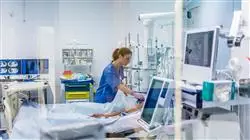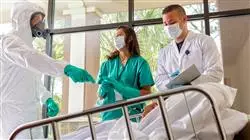University certificate
The world's largest faculty of nursing”
Introduction to the Program
Learn about the latest advances in Toxicological Emergencies by Industrial Products to be able to identify the toxicokinetics of antiseptics, disinfectants and sterilants and their treatment in case of acute poisoning”

Nearly two million people around the world suffer from some type of poisoning. At the workplace level, many of these substances are due to the change that the industry of all types has made in recent years. In this way, constantly exposing yourself to them can cause problems in the body. Although this risk is almost always controlled, sometimes accidents occur, so it is normal for a patient to present in the emergency room with toxicological symptoms due to industrial products.
Therefore, rapid and effective action is essential to counteract the symptoms quickly. Therefore, having trained personnel trained in the detection of the basic and general principles of patients with severe poisoning.
With this program focused specifically on this topic, students will be provided with the necessary knowledge to successfully address the professional challenge of caring for patients with poisoning from industrial products. The program is fundamentally aimed at the daily exercise of the profession, allowing the identification of the toxicokinetics of antimalarials and antiparasitics and their treatment in case of acute poisoning.
The contents of this Postgraduate diploma are structured in large groups of topics with pedagogical coherence. In this way, the student will be able to understand the appropriate way to carry out an evaluation of an intoxicated patient, explaining the different alterations due to lead poisoning or smoke inhalation.
Furthermore, it is a 100% online Postgraduate Certificate that provides students with comfortable study and ease, wherever and whenever they want it. All you need is a device with internet access to take your career one step further. A modality in keeping with the current times with all the guarantees to position the nurse in a highly demanded sector.
This Diploma in Toxicological Emergencies by Industrial Products will help you Explain the toxicokinetics of fluorine and hydrofluoric acid and its treatment in case of acute poisoning"
This Postgraduate diploma in Toxicological Emergencies by Industrial Products for Nursing contains the Scientific most complete and updated program on the market. The most important features of the program include:
- The development of clinical cases presented by toxicology experts
- The graphic, schematic, and practical contents of which they are composed provide scientific and practical information on the disciplines that are essential for professional practice
- Practical exercises where the self-assessment process can be carried out to improve learning
- Clinical iconography and diagnostic imaging tests
- An algorithm-based interactive learning system for decision-making in the clinical situations presented throughout the course
- Its special emphasis on toxicology research methodologies
- Theoretical lessons, questions to the expert, debate forums on controversial topics, and individual reflection assignments
- Content that is accessible from any fixed or portable device with an Internet connection
Seize the opportunity to Explain the toxicokinetics of asphyxiants and pulmonary irritants and their treatment in case of acute poisoning”
The program’s teaching staff includes professionals from the sector who contribute their work experience to this educational program, as well as renowned specialists from leading societies and prestigious universities.
Its multimedia content, developed with the latest educational technology, will allow the professional a situated and contextual learning, that is, a simulated environment that will provide an immersive training programmed to train in real situations.
The design of this program focuses on Problem-Based Learning, in which the professional will have to try to solve the different professional practice situations that will arise throughout the academic course. For this purpose, the student will be assisted by an innovative interactive video system created by renowned experts.
Complete a program carried out by experts in this sector and position yourself as a high-level professional"

Increase your decision-making confidence by updating your knowledge through this Postgraduate diploma"
Why study at TECH?
TECH is the world’s largest online university. With an impressive catalog of more than 14,000 university programs available in 11 languages, it is positioned as a leader in employability, with a 99% job placement rate. In addition, it relies on an enormous faculty of more than 6,000 professors of the highest international renown.

Study at the world's largest online university and guarantee your professional success. The future starts at TECH”
The world’s best online university according to FORBES
The prestigious Forbes magazine, specialized in business and finance, has highlighted TECH as “the world's best online university” This is what they have recently stated in an article in their digital edition in which they echo the success story of this institution, “thanks to the academic offer it provides, the selection of its teaching staff, and an innovative learning method aimed at educating the professionals of the future”
A revolutionary study method, a cutting-edge faculty and a practical focus: the key to TECH's success.
The most complete study plans on the university scene
TECH offers the most complete study plans on the university scene, with syllabuses that cover fundamental concepts and, at the same time, the main scientific advances in their specific scientific areas. In addition, these programs are continuously being updated to guarantee students the academic vanguard and the most in-demand professional skills. In this way, the university's qualifications provide its graduates with a significant advantage to propel their careers to success.
TECH offers the most comprehensive and intensive study plans on the current university scene.
A world-class teaching staff
TECH's teaching staff is made up of more than 6,000 professors with the highest international recognition. Professors, researchers and top executives of multinational companies, including Isaiah Covington, performance coach of the Boston Celtics; Magda Romanska, principal investigator at Harvard MetaLAB; Ignacio Wistumba, chairman of the department of translational molecular pathology at MD Anderson Cancer Center; and D.W. Pine, creative director of TIME magazine, among others.
Internationally renowned experts, specialized in different branches of Health, Technology, Communication and Business, form part of the TECH faculty.
A unique learning method
TECH is the first university to use Relearning in all its programs. It is the best online learning methodology, accredited with international teaching quality certifications, provided by prestigious educational agencies. In addition, this disruptive educational model is complemented with the “Case Method”, thereby setting up a unique online teaching strategy. Innovative teaching resources are also implemented, including detailed videos, infographics and interactive summaries.
TECH combines Relearning and the Case Method in all its university programs to guarantee excellent theoretical and practical learning, studying whenever and wherever you want.
The world's largest online university
TECH is the world’s largest online university. We are the largest educational institution, with the best and widest online educational catalog, one hundred percent online and covering the vast majority of areas of knowledge. We offer a large selection of our own degrees and accredited online undergraduate and postgraduate degrees. In total, more than 14,000 university degrees, in eleven different languages, make us the largest educational largest in the world.
TECH has the world's most extensive catalog of academic and official programs, available in more than 11 languages.
Google Premier Partner
The American technology giant has awarded TECH the Google Google Premier Partner badge. This award, which is only available to 3% of the world's companies, highlights the efficient, flexible and tailored experience that this university provides to students. The recognition as a Google Premier Partner not only accredits the maximum rigor, performance and investment in TECH's digital infrastructures, but also places this university as one of the world's leading technology companies.
Google has positioned TECH in the top 3% of the world's most important technology companies by awarding it its Google Premier Partner badge.
The official online university of the NBA
TECH is the official online university of the NBA. Thanks to our agreement with the biggest league in basketball, we offer our students exclusive university programs, as well as a wide variety of educational resources focused on the business of the league and other areas of the sports industry. Each program is made up of a uniquely designed syllabus and features exceptional guest hosts: professionals with a distinguished sports background who will offer their expertise on the most relevant topics.
TECH has been selected by the NBA, the world's top basketball league, as its official online university.
The top-rated university by its students
Students have positioned TECH as the world's top-rated university on the main review websites, with a highest rating of 4.9 out of 5, obtained from more than 1,000 reviews. These results consolidate TECH as the benchmark university institution at an international level, reflecting the excellence and positive impact of its educational model.” reflecting the excellence and positive impact of its educational model.”
TECH is the world’s top-rated university by its students.
Leaders in employability
TECH has managed to become the leading university in employability. 99% of its students obtain jobs in the academic field they have studied, within one year of completing any of the university's programs. A similar number achieve immediate career enhancement. All this thanks to a study methodology that bases its effectiveness on the acquisition of practical skills, which are absolutely necessary for professional development.
99% of TECH graduates find a job within a year of completing their studies.
Postgraduate Diploma in Toxicological Emergencies by Industrial Products for Nursing
Toxicological emergencies due to industrial products are situations in which a person, either by contact, ingestion or inhalation of toxic substances present in industrial products, can develop a series of serious symptoms and complications that endanger their health. In the hospital setting, nursing is often the first point of contact for patients who are victims of industrial product poisoning. Nursing staff must be trained to provide immediate and appropriate care to control the effects of the poisoning, prevent serious complications and generally improve the prognosis of patients.
Common industrial products often involved in toxicological emergencies include aggressive chemicals, solvents, acids, alkalis, metals and toxic gases. If a person comes into contact with a toxic substance or inhales toxic fumes, he or she may experience a variety of symptoms such as nausea, dizziness, skin irritation, lung inflammation, burns, and in severe cases even convulsions, coma or death. Treatment of industrial product toxicology emergencies in nursing may include measures such as administration of antidotes, cleanup and neutralization of the toxic substance, and constant monitoring to detect and control possible complications of the clinical picture.
It is important for nurses to have the necessary training and experience to be able to identify the signs and symptoms of industrial product poisoning early, and to be able to initiate appropriate treatment to protect the patient's life and health.
TECH, the world's largest digital university, has an academic program designed to provide students with the knowledge necessary to identify chemicals and human health effects, perform proper patient assessment and apply appropriate treatments in the event of toxic chemical exposure. Students learn how to handle a variety of emergency situations, such as industrial chemical accidents, toxic exposures at home, at work or elsewhere. They also acquire skills in the evaluation and treatment of patients with illnesses related to toxic chemical exposures and promote preventive safety in relation to chemicals and their effects.
They also acquire skills in the evaluation and treatment of patients with illnesses related to toxic chemical exposures and promote preventive safety in relation to chemicals and their effects.







